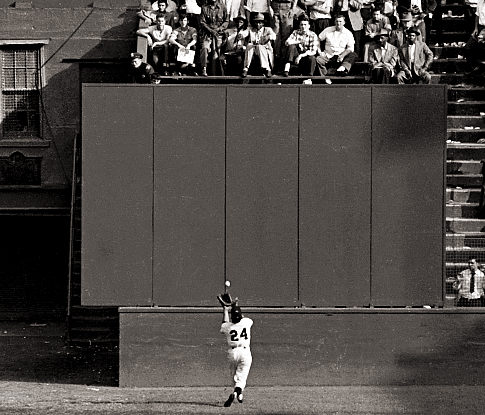 Indians Archive
Indians Archive  Summer of Shadows Excerpt: The Catch
Summer of Shadows Excerpt: The Catch
The following is an excerpt from Summer of Shadows: A Murder, a Pennant Race, and the Twilight of the Best Location in the Nation by Jonathan Knight:
Giants manager Leo Durocher, realizing the critical moment the game had reached, quickly pulled Maglie and called on part-time starter Don Liddle to put out the fire. He’d face fellow lefty Vic Wertz, who’d added a pair of singles to his first-inning three-bagger and was enjoying one of the finest days in his career, which four months before had appeared to be limping to a disappointing conclusion.
Working quickly, Liddle got ahead of Wertz one-and-two. His fourth pitch, a fastball, rocketed through the shadow cast by the grandstand that now stretched halfway across the infield, but Wertz read it perfectly. His hands tightened on the handle of the bat, flattening the tiny bit of sponge in his left hand. He was so locked in on the trajectory of the ball, he wasn’t even sure what kind of pitch it was, simply that he was about to clobber it. And he did.
“When I smacked the ball,” Wertz would say later, “it felt so good, and I was so sure of how hard I tagged it that all the details were erased from my mind.” It was, he added, the hardest he’d ever hit a ball in his life.
The crack of the bat echoed through the Polo Grounds like a rifle shot, and even those leaning against the rafters of the ballpark could tell that Wertz had gotten all of the pitch. The ball soared into the outfield as if fired from a rocket. The players inside the Cleveland dugout rose to their feet and watched the white fleck zoom across the blue sky. They knew Wertz had hit a game- winning, three-run home run.
Such dramatics were nothing new to them. Unheralded players had risen to the occasion throughout the long, sweltering summer, winning and saving games from the clutches of defeat. This time it would be Vic Wertz’s turn. A promise he’d made to Lemon on their previous trip to New York had just been delivered.
So enraptured with the path of the baseball, nobody, at first, noticed Willie Mays. Rosen, his right leg heavily taped to comfort a nagging charley horse suffered three weeks earlier—the latest in a line of injuries that plagued him in 1954—immediately sprinted toward second, knowing that in case the ball somehow hit the wall and ricocheted back into play, he’d need every second to make it around the bases on his bum leg.
Doby, as Cleveland’s center fielder, was more familiar with the area the ball was carrying toward and was more cautious. He skipped halfway between second and third and paused. Not only did he know better than his teammates just how far it was to the center field wall in this bastardized ballpark, but he also knew that the Giants’ young center fielder was one of the rare ballplayers who was just as good as everyone said he was.
In that first second after Wertz’s shot cleared the infield and began its course toward history, Willie Mays’s actions were almost laughable. He turned with his back completely facing the plate and began running “like a scared deer,” The Sporting News would describe, toward the dark canyon just to the left of straightaway center field. Of the better than 53,000 people in the park that day, none thought Willie Mays had a chance of catching up with the ball. None, that is, but Mays himself.
As the ball cruised out of the shadow of the grandstand and was illuminated by the bright autumn sun, Mays craned his head slightly over his right shoulder to follow its path. The ball began its descent right about where it would have cleared the fence in any of the other fifteen stadiums in Major League Baseball. But with the Polo Grounds fence still another forty feet in front of him, Mays now knew he had it. He had enough time, in fact, to begin his habit of slapping his glove with his throwing hand the way he did before every routine catch.
Finally, in a drawn-out moment that seemed to last much longer that it actually could have, Mays—the “24” on the back of his jersey still squared toward the infield—held out his left hand and watched Vic Wertz’s dream settle into it. Mays’s cap spiraled off his head and floated into the grass behind him.
In the years to come, the catch would be described as the greatest in the history of the game, one that only Mays could have made. Naturally, Cleveland fans, while impressed by the snag, scoffed at the notion. Partially it was sour grapes. But more than that, they’d seen Larry Doby make comparable catches for years, many of which he’d had to contend with outfield fences to achieve. For instance, Mays’s catch paled next to that truly incredible one Doby had made in Cleveland back in July—on the night the detectives finally got Dr. Sam.
For a moment, there was no sound at all. It was as if the air had been taken out of the Polo Grounds and for one perfect instant, fifty thousand people were unable to react. But then, as the magnitude of what they’d just witnessed settled in, they did. The crowd exploded into applause as Mays skidded to a stop a few feet in front of the center field wall, turned and fired the ball back toward the infield before falling to his knees.
It would have been possible for a runner with Doby’s speed to tag up from second base and come around to score in the time it would take the ball to be shipped back to the infield, essentially a New York City cab ride from home plate. But Mays’s throw, while harried, was on target. Doby had been able to scamper back to second, tag up, and motor to third. Rosen, pulling into second as Mays caught up with the ball, had no choice but to turn and hobble back to first without even entertaining the option of tagging up. Wertz returned to the dugout, stunned. The greatest hit of his life had turned into nothing more than what was known in the game as a “loud out.”
This wasn’t supposed to happen.
The thought ran through the minds of fans back in Cleveland as they watched, listened to, or heard about the miraculous catch. It had been a summer of promising omens and portents—all of them signaling that 1954 belonged to the Cleveland Indians. Every break had gone their way. Each time a key player was injured, and they’d suffered more than their share, a reserve would step up and deliver. Adversity was nothing new to the Indians, but Mays’s catch marked the first time all season that fate betrayed them.
The rest of the inning is lost to history, drowned out in the thunderclap of the catch. Pinch-hitter Dale Mitchell walked to load the bases with one out, and the Indians were still in prime position to take command of the game. Had they done so, Willie Mays and the most celebrated catch in World Series history would have become minor footnotes to Cleveland’s 112th victory of a blessed season.
Dave Pope, a valuable pinch-hitter all season, struck out looking on a one-and two pitch, leaving it up to eleven-year-veteran catcher Jim Hegan, who had a knack of coming through in the clutch. He also fell behind one-and- two, but then blasted the next pitch toward left. Hegan knew he’d gotten all of the pitch and watched it soar toward the upper deck, following the same path as Bobby Thomson’s “shot heard round the world” homer that won the pennant here three years before. Hegan knew he’d belted a grand slam that would prove once again that these Indians were a team of destiny—that no matter what misfortune came their way, they would respond and overcome.
But as he neared first, his gaze still on the ball, he couldn’t believe his eyes. From the Cleveland bullpen in right center, Hal Newhouser saw it, too. It was as if an invisible hand was pushing the ball down. Hegan saw New York’s left fielder, Monte Irvin, slowing down at the base of the wall, but not in the slumped-shouldered manner of an outfielder knowing he didn’t have a chance. Irvin’s posture was straight as an arrow, and he was raising his left arm. Hegan realized Irvin thought he had a play.
And with another look up to the ball, Hegan saw that Irvin did. The steady wind blowing in from left field all afternoon had caught Hegan’s grand slam in its stream. Instead of becoming a souvenir, the ball plopped into the glove of Monte Irvin, who had pressed his spine against the wall like a child being measured on his birthday. Irvin later said the ball missed hitting the light overhang of the scoreboard by less than six inches.
Two walks, one hit, one incredible catch, and one wind- induced fly ball. No runs. Both the land and the air had turned against the team of destiny.
Summer of Shadows is now available at amazon.com and bookstores everywhere.
Jonathan will be signing copies of the book at the Polaris Fashion Place Barnes & Noble in Columbus on Saturday, April 9 at 2 p.m.
- NBA Announces 2013-2014 Schedule
- Browns Ink Sharknado
- Sharknado A No-Show For Rookie Camp
- Trent Richardson Out Until Training Camp
- Browns Sign Brandon Jackson
- Carrasco Suspended Eight Games
- Browns Add to Wide Receiver Depth with David Nelson
- Browns Need to Learn from Past Draft Mistakes
- Browns Release Chris Gocong and Usama Young
- Browns Missing on Grimes Disappointing, But Not The End
The TCF Forums
- Chris Grant's first 3 drafts
Kingpin74 (Tuesday, January 21 2014 10:13 AM) - The 2014 Offseason Thread
googleeph2 (Tuesday, January 21 2014 9:36 AM) - 2015 Recruiting
furls (Tuesday, January 21 2014 6:57 AM) - Mike Brown
YahooFanChicago (Monday, January 20 2014 11:15 PM) - Movies coming out
HoodooMan (Monday, January 20 2014 9:34 PM) - 2014 Hoops Hockey Hijinx
jpd1224 (Monday, January 20 2014 4:44 PM) - 2014 Recruiting
jclvd_23 (Monday, January 20 2014 2:26 PM) - Wish List - #4 Pick
Hikohadon (Monday, January 20 2014 1:26 PM) - Official- Browns Coach Search/Rumors
OldDawg (Sunday, January 19 2014 6:48 PM) - #1 overall pick Anthony Bennett
TouchEmAllTime (Sunday, January 19 2014 1:28 PM)



